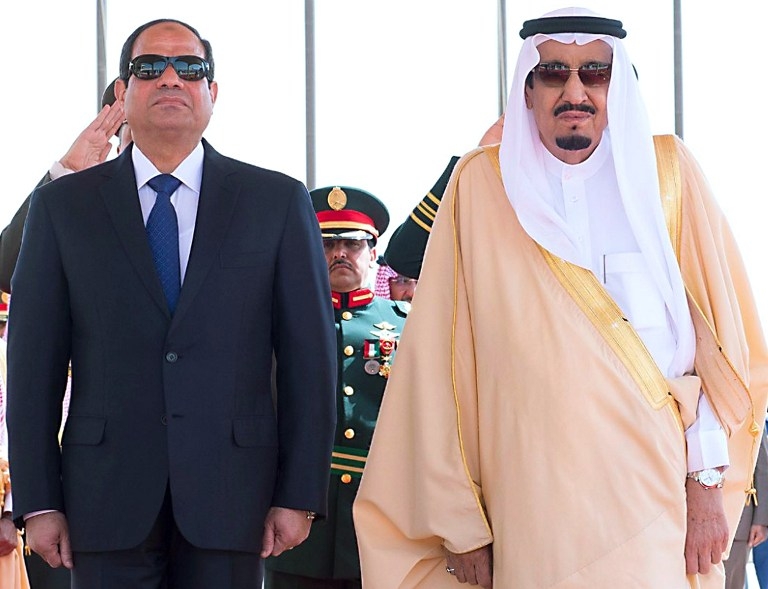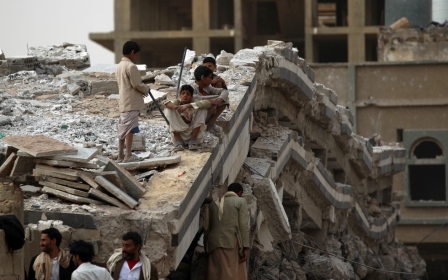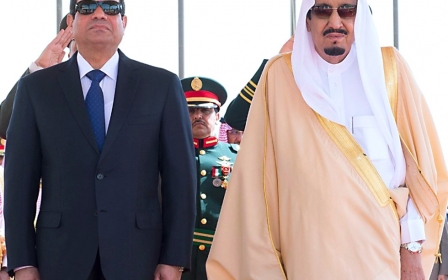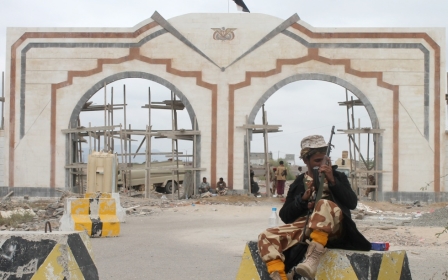Did Yemen cause the tides to turn between Egypt and Saudi?

Since Saudi Arabia launched its military operation against the Houthis in Yemen on Wednesday night, several Arab states have declared their support for the intervention, not least of those Egypt.
Egypt reportedly sent four warships on Thursday through the Suez Canal en route to the Gulf of Aden in order to support the military operation, dubbed Decisive Storm, while Foreign Minister Sameh Shoukri said that Egypt would commit ground troops if necessary.
Although Egypt seemed to be fully on board with the Saudi intervention in Yemen, the early promise of ground support contradicted Saudi statements, which stressed that there were no current plans to send in boots on the ground.
At the same time, some reports late on Thursday suggested that Egypt had not been informed of the timing of the offensive, suggesting that Riyadh did not consider it a credible ally.
According to pro-Muslim Brotherhood Al Jazeera anchor Ahmed Mansour: “The Gulf States surprised Sisi with Decisive Storm and did not seek his support after his betrayal and his secret meetings with the Houthis, Iran and Syria to plot against the Gulf were uncovered."
"When Sisi woke up and found the Gulf countries had started a war to confine Iranian hegemony, Sisi hurried to declare his support for the operation and his readiness to take part in it. But the Gulf had already taught him a lesson,” Mansour said via his Facebook page on Thursday afternoon.
In a tweet, Jamal Khashoggi, a Saudi journalist considered close to the Saudi government denied the credibility of an Egyptian military source announcing the entry of Egyptian and Saudi ground forces into Yemen, adding that: "No one makes statements regarding the operation other than Riyadh."
On top of the Arab League Summit's agenda, to be held in Sharm el-Sheikh on Saturday, is the Yemen crisis. Some analysts say the meeting was meant to decide upon a joint action regarding Yemen and that Saudi airstrikes over Sanaa had jumped the gun.
Egyptian journalist and commentator Mohamed Hassanein Heikal expressed his anger toward the Gulf states for launching the military operation in Yemen without waiting for the Arab Summit to convene this weekend, reported Arabi21.
In a statement Heikal said that “it seems that the urgency of the situation led to forgoing of the plan which included making the intervention a result of the summit, especially that establishing a pan-Arab force is on the top of the meeting agenda.”
The annual summit was expected to be dominated by Cairo-led calls for a joint military force as Yemen and several other states teeter on the brink of collapse, after militant groups established a foothold in neighbouring Libya and took control of large parts of Iraq and Syria.
Arab League chief Nabil al-Arabi, who had been tasked with overseeing a report on a joint military force to present to the leaders, told AFP that summit's "major concern" should be the militant threat throughout the Arab world.
Heikal suggested that this move caused Sisi to lose his chance at carrying out plans for establishing a pan-Arab force that would serve his political interests, while the director of the Gulf and Energy Policy Program at the Washington Institute for Near East Policy, Simon Henderson had suggested in his piece in Foreign Policy on Thursday that the Arab summit may have signifed a comeback for Egypt as a regional leader in the Middle East.
While some analysts pointed to the urgency of the situation in Yemen - by Wendesday morning the Iraninan-backed militia was closing in on Aden - as the prime reason behind Riyadh's hasty decision to strike against the Houthis in Sanaa, other observers suggested that Riyadh may not have reached out to Egypt due to its "undeclared" talks with the Houthis.
The Houthis released a statement on Thursday saying that the group's revolutionary council appreciates Egypt’s supportive stance regarding the crisis in Yemen and values Egypt’s position against intervention in their country, adding that they hope Egypt maintains this stance, reported Aljareeda news website.
Furthermore, during a demonstration organised by the Houthi militant group in Sanaa to protest against the Saudi airstrikes on Thursday, an unidentified Houthi leader addressed Sisi saying: “Yesterday you were with us, why did you turn against us today?” according the Houthi satellite channel Al-Massirah.
There have been several reports over the past month alleging a clandestine relationship between the Egyptian government and Houthi leadership in Yemen.
Egypt’s al-Shorouk newspaper reported on 2 March that “Egypt has invited the Houthis to visit Cairo as part of a wider initiative to engage with all sides of the Yemeni conflict,” while Yemeni journalist Hamed al-Qassem told al-Shorouk newspaper that Houthi representative and leader Hussein al-Izzy would be visiting Cairo that week.
Yemeni news website Yemen-24 also reported on 2 March that Abdallah al-Ajri, member of the Houthi political council, announced that al-Izzy would meet with Yemen’s permanent Arab League representative to discuss potential cooperation with Egypt.
Egyptian observers were surprised to see a Houthi delegation arrive in Cairo on the same days as Sisi's visit with Saudi’s King Salman in early March, saying: “Sisi’s approval of talks with the Houthis is in clear contradiction with Gulf initiatives defining the Houthis as an illegitimate authority,” according to Alain Online on 3 March.
At the same time as these visits, in what is usually seen as a reflection of government policies and direction, Egyptian TV anchor Yousef al-Husseiny said during a talk show on the satellite TV channel ONTV earlier this month: “If one day you wake up to find Egypt extending bridges of cooperation with Iran don’t be shocked.”
“Saudi Arabia will have no right to object to our relationship with Iran, because we have not objected to Saudi Arabia’s links with Ankara. No one has a right to interfere in our affairs.”
Although these statements may be seen as a reflection of the Sisi's leanings at the time, Egypt may have had to rectify its position toward Saudi Arabia.
Egypt denied that any meetings had been carried out between its government officials and the Houthi delegation and Egyptian media reported on the visit as a meeting between the Houthis and Yemen’s Arab League representative in Cairo.
Yasin Tamimy, a journalist and political analyst, said that the Egyptians' denial of meetings with the Houthis was a means to pacify Saudi Arabia, reported al-Sahwa news website on 8 March.
Egypt’s decision to support the operation may have been out of its desire to regain regional importance, revive its naval power, and give a strong message to its enemies elsewhere that it is not shying away from using its forces.
But Egypt’s precarious economic situation means that Cairo must pull off a tricky balancing act in Yemen, according to Sharif Nashashibi, an independent commentator on Arab affairs.
"The amount of financial aid and political support that Saudi Arabia has given Sisi mean that his participation was never in doubt," Nashashibi said. "But Egyptians will be worried about whether they can afford a potentially costly and protracted operation in Yemen. Sisi is trying to balance these two things.”
Egyptian political analyst Nervana Mahmoud expressed a similar view in her blog on Friday: “The rationale for Egypt’s current military participation in Yemen is not ideology or risks to the Suez Canal, as some have stated; it is more a simple acknowledgment that the leadership in Cairo cannot afford to say no to Saudi Arabia.”
Yemen controls the Bab el-Mandeb Strait at the southern entrance to the Red Sea, and any interference impacts the Suez Canal, Egypt’s greatest strategic asset, at the northern end.
Egypt’s involvement in Yemen is concerning to many, rekindling memories of President Gamal Abdel Nasser’s involvement in Yemen in the 1960s to support the Yemeni Republican coup d’état against the ruling Imam, who was backed by Saudi Arabia. The intervention drained Egypt’s military and financial resources.
Yemeni President Abd Rabbuh Mansur Hadi as well as several Saudi government officials arrived in Sharm el-Sheikh on Friday ahead of an Arab League meeting set to start on Saturday.
New MEE newsletter: Jerusalem Dispatch
Sign up to get the latest insights and analysis on Israel-Palestine, alongside Turkey Unpacked and other MEE newsletters
Middle East Eye delivers independent and unrivalled coverage and analysis of the Middle East, North Africa and beyond. To learn more about republishing this content and the associated fees, please fill out this form. More about MEE can be found here.




